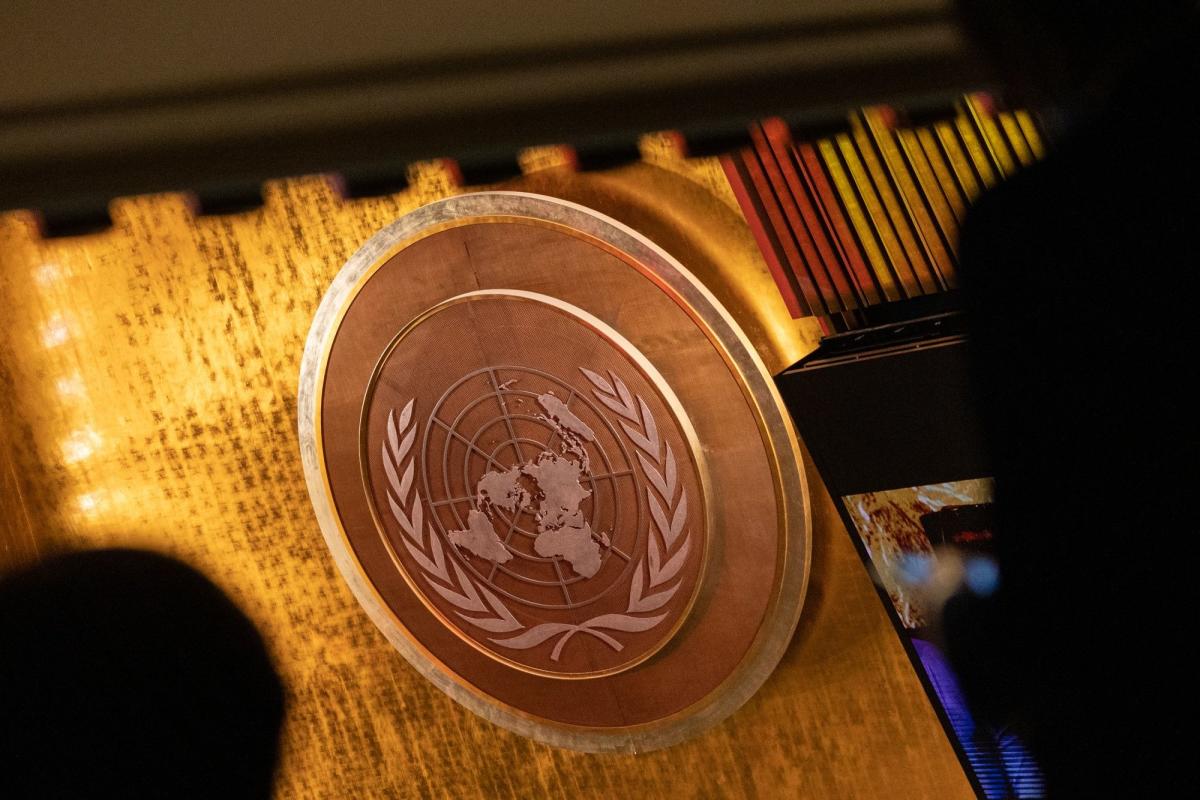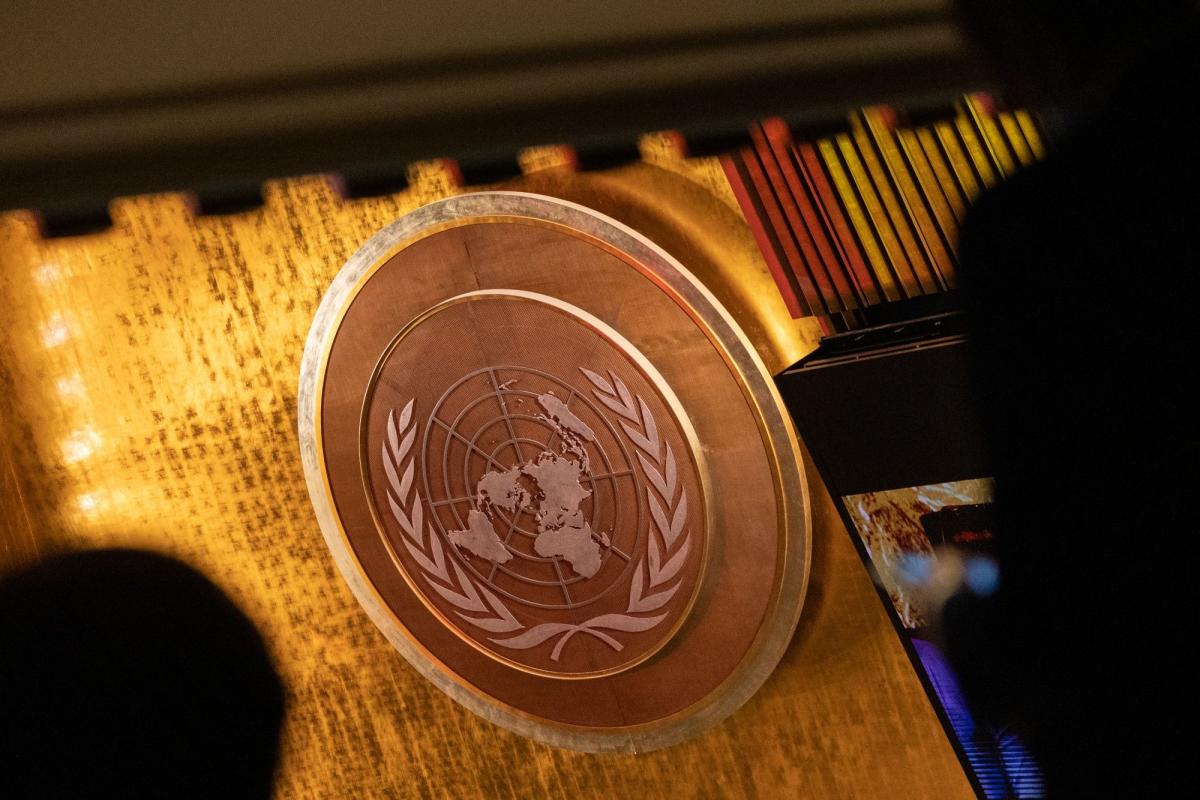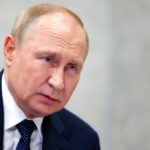
(Bloomberg) — Ukrainian President Volodymyr Zelenskiy, in a video address to the United Nations General Assembly on Wednesday, urged world leaders to keep up the pressure on Russia, which he said was “afraid of real negotiations.” Earlier, President Joe Biden took center stage at the UN to rally international support for Ukraine following Russia’s military escalation and Vladimir Putin’s threats, saying Russia had “shamelessly violated” the core tenets of the UN Charter.
Most Read from Bloomberg
Biden’s response came a day after France’s Emmanuel Macron and Germany’s Olaf Scholz decried Putin’s aggression, both accusing him of “imperialism.” On Wednesday, the Russian leader mobilized army reserves and renewed his nuclear threats. A series of important meetings took place on the sidelines as well, most notably that of Biden with the new UK prime minister, Liz Truss.
Click here for the full schedule of speakers on Wednesday.
(All times ET)
Essential reading:
-
EXCLUSIVE: Greece Is Ready for Potential Russian Gas Cutoff
-
How the UN Became a Bystander to the World’s Biggest Flashpoint
-
To catch up on the latest developments on Ukraine, click here.
-
And listen to our Twitter Space on UN’s struggle for relevance
-
Russia Is Left an Outlier Among World Leaders Gathered at the UN
US Sees General Assembly as Fertile Ground for Price Cap (8:20 p.m.)
US diplomats are using meetings on the sidelines of the General Assembly this week to push for other countries to adopt a price cap on Russian oil and petroleum products, a senior State Department official said.
With dozens of world leaders and hundreds of diplomats in New York, American officials are seizing the opportunity to explain how a price cap would work and what Washington hopes to achieve, according to the official, who asked not to be identified discussing private deliberations.
The US is emphasizing that the price cap is meant to limit President Vladimir Putin’s ability to finance the Ukraine war. They also stress — particularly to developing countries — that the mechanism can keep cheap Russian oil on the market and stabilize global energy prices, the official said, adding that countries have been receptive to the cap, especially those that haven’t previously discussed the subject with the US. Even nations that won’t agree to the cap understand they can benefit from discounts on Russian energy.
Zelenskiy Warns of Negotiations as Delaying Tactic (8 p.m.)
Ukrainian President Volodymyr Zelenskiy, in his speech, asked for more weapons to pursue his country’s efforts to repel Russia’s invasion and warned that Moscow would try to use the prospect of negotiations as a delaying tactic. The Russians, he added, are “afraid of real negotiations.”
He spoke of a recent prisoner swap between Russia and Ukraine and praised the efforts of Saudi Arabia in brokering the deal.
Yoon, Kishida Sit Down Together in New York
It was one of the most anticipated bilateral meetings in New York, and it finally happened. South Korean President Yoon Suk Yeol and Japanese Prime Minister Fumio Kishida took place because both men were attending the UN General Assembly. It’s the first meeting between the countries in nearly three years and was a chance to find a resolution to the issue of Korean labor conscripted to work in Japanese factories and mines during World War II.
“The two leaders shared the need to resolve the pending issues and restore a healthy relationship between Japan and South Korea, and agreed to develop Japan-South Korea relations in a future-oriented manner based on the foundation of friendship and cooperation built since the normalization of diplomatic relations in 1965,” according to a statement released by the Japanese government.
Park took office in May under the administration of newly elected conservative President Yoon Suk Yeol, who has been seeking to ease tensions from issues arising from Japan’s 1910-45 colonial rule over the Korean Peninsula. Tensions have come a boil in recent years and caused severe strains between the neighbors who are the US’s major military allies in the region.
Yoon and Kishida met briefly at a NATO summit in June but the last formal summit between the two countries took place in December 2019, when then Japanese Prime Minister Shinzo Abe met Yoon’s predecessor, President Moon Jae-in.
Trump-picked World Bank Boss Under Fire at UN (5 p.m.)
It’s one of the biggest talking points on the sidelines of the UN and among officials: why David Malpass insists on being a climate denier.
Pressure to replace the World Bank chief installed three years ago by former President Donald Trump has ramped up after his equivocations on the impact of burning fossil fuels sharpened criticism of the lender’s track record on climate change.
The controversy kicked off Tuesday when former US Vice President Al Gore labeled World Bank President David Malpass a climate denier and called for a change of leadership. Asked about the criticism during the same event in New York, Malpass dodged questions on the effects of man-made emissions on climate change before saying: “I don’t know. I’m not a scientist.”
Macron and Truss Appear to Put ‘Friend or Foe’ Question to Rest (earlier)
French President Emmanuel Macron appeared to try to bury the hatchet with the new UK Prime Minister Liz Truss on the sidelines of the UN General Assembly on Tuesday.
“There is a willingness to re-engage, to move forward and to show that we are, as it were, allies and friends in a complex world,” Macron told a group of reporters in New York City after the talks. “Now, I believe in evidence, and results.”
Macron’s government has repeatedly been at odds with former UK Prime Minister Boris Johnson’s, especially during post-Brexit negotiations and on issues related to migrants crossing the English Channel. When Truss was eyeing the position, she said “the jury’s out” on whether France was UK’s “friend or foe.”
The two leaders appeared to shake off tensions, smiling and shaking hands during a photo op preceding their meeting. Readouts of the conversation shared by their aides focused on their common stance on Ukraine and Russia rather than thornier issues including Northern Ireland.
Biden and Truss Present a United Front on Ukraine (2:31 p.m.)
Biden and Truss brushed shoulders at Queen Elizabeth II’s funeral but had to wait till now to formally sit down and get acquainted. At the Group of Seven summit in Germany, it was still Boris Johnson who was in power and the two men did not have a bilateral, a fact that the UK press was quick to pounce on.
Truss will take to the podium this afternoon. She’s a vocal hawk and the UK is the US’s closest geopolitical ally and on Ukraine the two countries are very much on the same page. Where there is tension is on the post-Brexit reality of a problematic Irish border.
The US president said he and Truss were both “committed to protecting” the Good Friday Agreement in Northern Ireland and that aiding Ukraine and countering China also were on the agenda.
The meeting was a chance for Biden and Truss to form a stronger personal bond and cool simmering tensions over trade and Northern Ireland. Truss has questioned the nature of the so-called “special relationship” between the US and UK.
Asked Wednesday if the “special relationship” is intact, Truss gave a single, firm head nod.
Read more: Biden-Truss Era Dawns With Caution, Doubt, Silence on Trade
Biden Says US Doesn’t Seek Conflict With China (11:32 a.m.)
Biden told the General Assembly that the US doesn’t seek conflict with China and will conduct itself as “a reasonable leader.”
“We do not seek a Cold War We do not ask any nation to choose between the United States or any other partner,” Biden said in his speech. He also sought to tamp down speculation that his recent pledge to defend Taiwan if China invades marks a change in US policy.
“We seek to promote peace and stability across the Taiwan Strait, remain committed to our one China policy, which has helped prevent conflict for four decades,” Biden said. “We continue to oppose unilateral changes in the status quo by either side.”
Macron To Discuss Gas Prices, Supplies With Biden (11:30 a.m.)
Macron expects to improve coordination on energy and food with the US following a meeting with Biden this afternoon on the sidelines of the UN General Assembly. Europe needs to secure gas supplies and “reasonable pricing,” Macron said.
The French President called for “everyone to put maximum pressure on President Putin for him to end this senseless war.”
He declined to say how France would react if Russia were to use nuclear weapons. France’s doctrine is not to take part in any escalation, Macron said.
War in Ukraine Is Not Going Well For Putin, Greek Premier Says (11:26 a.m.)
Putin is going to try everything to turn the table as his invasion is not going well, Greek Prime Minister Kyriakos Mitsotakis said.
“We’re all united in supporting Ukraine defend itself against an open act of aggression,” Mitsotakis told Bloomberg TV in New York. “The war is not going well for Russia and I’m convinced Putin won’t succeed.”
Biden Says Putin’s War is About ‘Extinguishing Ukraine’s Right to Exist’ (11:12 a.m.)
Biden opened his speech to the General Assembly by condemning Putin’s push to escalate his military campaign in Ukraine, condemning it as a “brutal, needless war.”
Biden again sought to rally support from the rest of the world to stand up against Putin.
“This war is about extinguishing Ukraine’s right to exist as a state, plain and simple. And Ukraine’s right to exist as a people. Whoever you are, wherever you live, whatever you believe, that should make your blood run cold,” Biden said.
Biden has marshaled a global campaign to aid Ukraine and counter Russia, authorizing billions of dollars of military assistance for Kyiv’s forces and imposing sanctions that have hobbled the Russian economy. That has helped turn the tide of the war, as Ukraine has pushed Russian forces out of territory they occupied in the northeast.
The US president has hailed the effort as proof he has been able to revitalize US alliances that were frayed by former President Donald Trump. Finland and Sweden, countries that for decades prized non-alignment, are on the brink of being welcomed into NATO amid concerns about Russian aggression. Existing allies have boosted defense spending, long a US goal.
Biden has also used bellicose language to condemn Russian President Vladimir Putin for his invasion, calling him a war criminal and declaring in a major address in Warsaw earlier this year that “this man cannot remain in power.”
The administration has earned plaudits for its response, helping Biden repair his image as a leader that was damaged by last year’s chaotic US withdrawal from Afghanistan. It has also been viewed as something as preview of how the US might respond to a potential future Chinese attack on Taiwan. Biden has said the US would come to the island’s defense in such an attack, erasing decades of so-called “strategic ambiguity” about the US’s posture toward Taiwan.
He will meet with Macron on the sidelines of the UN later today.
Iran Protests in New York (11 a.m.)
Hundreds of Iranians and others from across the US gathered at UN Plaza on Wednesday to protest Iranian President Ebrahim Raisi, following protests in his own country after the death in police custody of a 22-year-old woman accused of being inappropriately dressed.
In New York, attendees said they were there to fight for regime change. Chants, primarily in Farsi, called for the ousting of Raisi. Some called for the arrest of Raisi on US soil, denouncing that he was greeted upon arrival in New York with a US Secret Service detail.
Event speakers included former Kansas Governor Sam Brownback, former Connecticut Senator Joseph Lieberman, while many Iranian-Americans in attendance traveled from states across the US including California, Virginia, and Washington, D.C.
Read More: Why a Woman’s Death in Iran Has Ignited New Protests: QuickTake
Iran Accuses US and Holds up Photo of Soleimani (9:30 a.m.)
Iran’s President Ebrahim Raisi spoke from the podium as protests roil several cities in Iran following the death of a young woman who fell into a coma after being detained for flouting Islamic dress codes by the so-called “morality police.” State media reported six people were killed.
He accused the US of trampling on the nuclear accord and called for “justice” for General Qassem Soleimani, the Iranian general who was killed in a drone strike ordered by former President Donald Trump in 2020.
He held up a photo of Soleimani for the audience and admonished the US for “hypocrisy” and said the world “needs a strong Iran today.” He said his country would only agree to a nuclear deal that had tangible benefits for the country’s economy.
He made no mention of the protests that are currently embroiling his security forces — they have so far overshadowed his visit to New York and any efforts to break the latest deadlock in Tehran’s indirect talks with Washington to revive the 2015 nuclear deal. About 1000 Iranian-Americans are protesting his presence at the UN outside its headquarters.
It was his first in-person speech to the annual gathering and he’s the first hardline president to do so since Mahmoud Ahmadinejad, who once emptied the General Assembly hall after giving a diatribe against NATO, Israel and the West.
Moderate predecessors Hassan Rouhani and Mohammad Khatami whose appearances often raised hopes of unofficial, but quietly choreographed, run-ins with US presidents. Rouhani and Barack Obama came closest to a direct meeting when they shared a phone call in 2013, a history-making moment that defied decades of protocol against direct contact between the country’s leaders.
It turned out to be a turning point in US-Iran relations at the time, setting the scene for nuclear talks that would lead to a landmark accord in 2015. But by 2019 Donald Trump had arrived and, having abandoned that deal a year earlier and unleashed fresh sanctions on Iran, (unsuccessfully) tried to persuade Rouhani to meet him at the General Assembly. Rouhani declined the invite.
No contact is expected between Biden and Raisi at this gathering.
Nigeria Calls for More Debt Relief (9:50 a.m.)
Nigerian President Muhammadu Buhari called for more debt relief to be given to poorer nations.
A former army general, Buhari has served as president of Nigeria, which has Africa’s largest economy since 2015 and is due to step down next year after serving the maximum two terms. His tenure has been marred by spiraling state debt, rampant unemployment and widespread insecurity, with attacks being staged by Islamist group Boko Haram and other armed groups.
“The multifaceted challenges facing most developing countries have placed a debilitating choke-hold on their fiscal space,” he said at his last address to the General Assembly before leaving office next year. This situation requires “a global commitment to the expansion and extension of the debt-service suspension initiative to countries facing fiscal and liquidity challenges as well as outright cancellation for countries facing the most severe challenges,” he said.
Zelenskiy will Address Assembly via Video (9 a.m.)
Ukrainian President Volodymyr Zelenskiy this afternoon will address the 193-member via pre-recorded video. Given events on the ground, he was not able to attend in person so he was allowed to make a speech this way (it was voted on earlier this month).
Expect a combative speech, as Russia moves to annex occupied Ukrainian territory following a Ukrainian counteroffensive in the last few weeks that dealt Russian troops their worst defeats since the early months of the conflict. He’ll appeal to the international community to intervene and keep them engaged on the seven-month-long war.
In the past months, in his signature olive green combat T-shirt, he’s addressed many parliaments including US Congress, asking for military help to fight Russia back over the border.
Back in April, he unleashed his fury on the Security Council, where Russia is a permanent member and has wielded its veto to block any resolution on Ukraine. “Are you ready to close the UN? Do you think that the time of international law is gone? If your answer is no, then you need to act immediately,” he said via video link to a silent chamber.
Scholz Slams Putin for Defying Global Peace (Tuesday)
Scholz called on other countries to condemn the Russian president’s decision to invade Ukraine. “The return of imperialism is not just a disaster for Europe. This is also a disaster for our global peace order, which is the antithesis of imperialism and neo-colonialism,” Scholz said.
Putin will only give up the war when he realizes that he can’t win and he’s isolated, the chancellor added. He condemned Russia’s attempts to stage “sham referenda” in the eastern regions of Ukraine.
Scholz added the Security Council must be reformed to better reflect the rise of developing countries. He has been asking member states to support Germany’s candidacy.
The chancellor denounced China for its human right record. “A few weeks ago, the former High Commissioner for Human Rights presented us with her report on the situation of the Uyghurs in Xinjiang,” Scholz said, adding the Chinese government should implement those recommendations.
UN Report Accuses China of ‘Serious’ Rights Abuses in Xinjiang
Japan PM Says UN’s Credibility at Stake (earlier)
Fumio Kishida said the invasion of Ukraine by Russia, a member of the UN Security Council, puts the credibility of the United Nations at stake. In a speech to the General Assembly, he called for an end to decades of debate on the “dysfunctionality” of the council and said a swift start should be made on reforms.
A native of Hiroshima, one of the two cities to have suffered a World War II nuclear attack by the US, he called Russia’s threats to use atomic weapons “absolutely unacceptable.”
Macron Accuses Putin of Return to ‘Imperialism’ (earlier)
The French President, an unapologetic multilateralist, once again defended his decision to keep speaking to Vladimir Putin, and urged all countries to condemn the invasion of Ukraine explicitly.
“It’s not about picking a side between the East and the West, neither between the North and the South,” he said. “It’s about the responsibility of all those who care about the respect of the Charter, and about our most precious good: Peace.”
In some of his strongest language yet, he denounced Russia’s actions as a “return to the age of imperialism and colonies,” of trying to rope in the support of countries that have lived through colonialism and are now reluctant to raise their voice against Russia.
Those who remain silent today are complicit, he said, after slamming his fist on the lectern.
Most Read from Bloomberg Businessweek
©2022 Bloomberg L.P.




